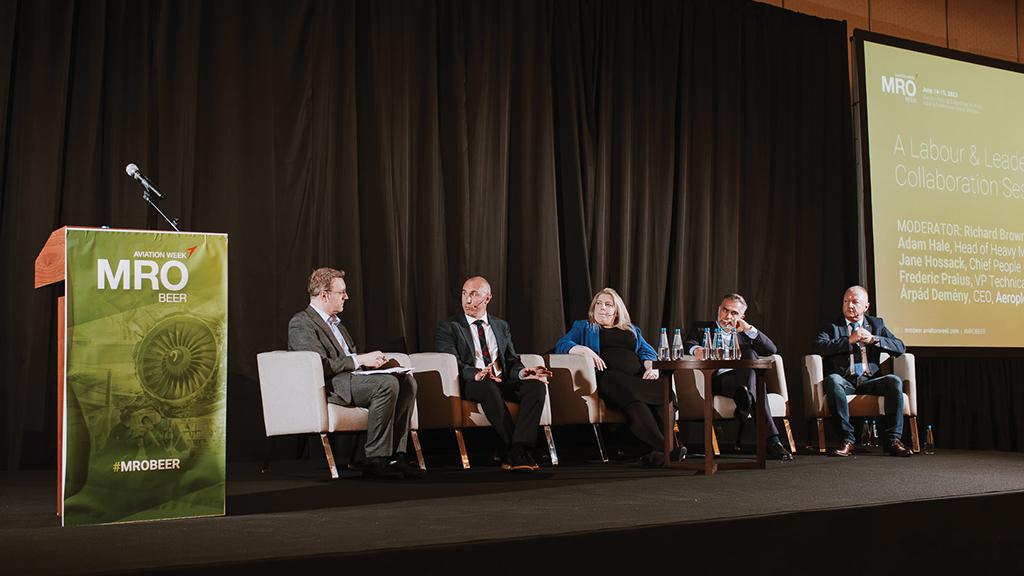Supply Chain, Labor Challenges Persist In Central And Eastern Europe

A panel discussion at MRO BEER about labor shortages and leadership issues featured (from left): Richard Brown, managing director, Naveo Consultancy; Adam Hale, head of heavy maintenance, Ryanair; Jane Hossack, chief people officer, AJW Group; Frederic Pralus, vice president technical, Avion Express; and Arpad Demeney, CEO, Aeroplex.
Region Still Suffering From Labor Shortages
Access to skilled labor is unanimously seen as the primary challenge in Central and Eastern Europe’s MRO segment, according to a discussion on regional aftermarket challenges at MRO BEER.
“The biggest challenge for us is manpower and the right number of people with the right skills in the right place to find them,” said Piotr Kaczor, CEO of Avia Prime, a holding group that operates several MRO facilities in Poland, Serbia and Slovenia while also providing line maintenance in Montenegro, Macedonia and Kosovo.
Kaczor said Avia has about 2,500 employees across its businesses and did not lay off staff during the COVID-19 crisis. But with demand for MRO services now much higher than it was during the pandemic, Kaczor considers acquiring and retaining skilled labor a bigger issue than other challenges, such as parts supply and logistics, because it is very much a longer-term problem. “With people it’s not so easy because we are not able to train them from nothing to fully skilled in a short period,” he added.
Lithuania-based FL Technics, which operates facilities at its main base there as well as in the UK, Germany and Indonesia, is seeing staffing challenges in Europe but not in the Asia-Pacific region. “The only place where we do not see any problems with the manpower is Indonesia,” said FL Technics CEO Zilvinas Lapinskas, adding that Indonesia has around 20 different colleges and universities that produce more than 3,500 ready-to-work engineers per year.
In Western Europe, where Lapinskas says Germany and the UK have similar labor-related challenges, the situation in the latter has been made more complicated by Brexit. “It’s an additional headache because to bring people from abroad to the UK is now very complicated and takes time with all the processes and procedures,” he said.
Vector Group, an aviation holding group based in Tel Aviv, is also seeing labor as a primary challenge for the region. Vector operates four companies in four locations: Bulgarian airline Electra Airways, Bulgarian MRO provider ETG Maintenance, Ireland-based leasing company Maverick Horizon and Classic Air, a charter and ACMI company based in Malta. Matvey Koloturskiy, the company’s deputy CEO, cited labor followed by shortages of spare parts and extended lead times as the group’s main challenges. “We have to be very creative to find ways on how to deal with that on an everyday basis,” he said of the labor issue.
Koloturskiy said the company has worked to develop an internal program to examine how to attract employees and keep them through career pathways and internal benefits. It has also focused on creating an MRO hub of its own in Varna, Bulgaria and plans to establish a presence in Burgas, setting it apart from the majority of Bulgaria’s MRO providers, which are based in Sofia, the country’s capital.
Tried and tested recruiting strategies also continue to be popular, with many MROs doubling down on working closely with aircraft maintenance training schools and developing apprenticeship programs.
These include Ireland-based carrier Ryanair, which has a significant presence in Central and Eastern Europe. Adam Hale, head of heavy maintenance at the low-cost carrier, noted that attracting new talent into the industry has become increasingly difficult.
“We have a lot of training programs already and we have more training programs in place,” says Hale, who cited current programs at its Dublin home base, its MRO facility in Prestwick (Scotland) and London Stansted as examples of these. He also said the carrier runs these programs in conjunction with several education institutes.
In Hungary, MRO provider Aeroplex also works with local education centers to combat the post-COVID-19 shortage of workers as people have left the industry as well as more country-specific factors such as younger Hungarians moving abroad to pursue aviation careers. Long-term, the company’s CEO Arpad Demeny said that a more collaborative approach is needed across the industry to address these challenges.
“A few MROs need to come together and look for the potential options for collaboration and see how we could make some kind of rotation,” he says.
Russia-Ukraine Conflict Adds to Supply Chain Stresses
The current stressed state of the global MRO supply chain, brought about by multiple factors including post-COVID labor shortages, has meant companies are looking at smarter and more agile ways of servicing growing maintenance demand. While improvements in the region’s supply chain provide reasons for optimism for its eventual recovery, the consensus at MRO BEER was that this would not happen fully until at least 2025.
Alistair Dibisceglia, director of aviation, aerospace and defense at Oliver Wyman, said that a lack of specific materials for OEMs in the region is a primary source of supply chain delays. “There is lack of raw material as well because of the conflict between Russia and Ukraine, so the OEMs are not getting the steel and the titanium that they need to build their engines,” he said.
The geopolitical impacts, both regionally and globally, have been significant and have resulted in additional challenges, including contributing to rising inflation. Among the regions most affected have been the Central and Eastern European nations neighboring Russia and Ukraine. “What the industry was doing at first was trying to buy material from OEMs but because of double-digit inflation this was not very cost-effective, and also the lead times are very long,” Dibisceglia noted. To address these issues, MRO providers are sourcing more used serviceable material parts and increasingly turning toward parts manufacturer approval and designated engineering representative repairs.
Extended lead times continue to trouble MRO providers in the region and surrounding countries. Fulya Turkoz, head of sales engine services for EMEA at German MRO giant Lufthansa Technik, said that lead times have become an even bigger issue compared to last year, while the company is also still dealing with ongoing issues such as labor shortages and material costs.
“We see a lot of improvements compared to last year, but still none of our units from base maintenance were delivered on time,” said Deniss Zilkins, chief operating officer at Latvia-based charter and cargo carrier SmartLynx Airlines, who explained that the seasonal nature of the carrier’s operations has especially been affected by these extended lead times. “We are not speaking about a slight delay of arrival, but massive delays. If we are expecting aircraft to become ready from base maintenance since the beginning of the season, and it arrives in the middle of the season or the end of it then we’re losing business opportunities,” he said.
Zilkins says the Russian invasion of Ukraine has “destroyed” the conventional way of thinking for the aviation industry and this has led airlines such as SmartLynx to revise some strategies to adapt to a changed environment. For example, when planning ahead for the maintenance of its fleet, which numbers more than 60 aircraft and includes variants of the Airbus A320 family, A330 and Boeing 737 MAX, Zilkins said it needs to plan much more in advance, while taking an adaptive and flexible approach to working with MRO providers. “We’re trying to predict what will be the challenges, what will be the visit timelines and deadlines for the release of the aircraft and even identify scenarios such as what will be the main issues in repairing the cabin?”
Regional Airlines Seek Right Balance for Digitalization
The region’s MRO industry is looking further at digitalization to drive efficiency, cost reduction and sustainability. The panelists stated the need to prioritize business objectives when considering digitalization initiatives. Matti Karttunen, head of repair services technical operations at Finnair, emphasized the significance of starting with a clear purpose and building from there. “Without having a clear vision, we would be unable to utilize technologies like augmented reality,” he said.
The panelists unanimously agreed on the pivotal role of data in driving digital transformation within their maintenance operations. Niklas Kropp, program and projects manager for engineering and maintenance at Germany-based leisure carrier TUI Airways, recognizes the importance of “aligning the data and making sure that the data is clean” for effective digitalization. “If we have the wrong data then we can’t drive digitalization,” he added.
Miroslav Katalinic, head of maintenance operations at Spanish low-cost carrier Vueling, noted: “What is important is data; the data is there. What we need to know is how to interpret the data into information that we need to use.”
The panelists also highlighted how digitization efforts have improved efficiency and reduced costs within their maintenance operations. Kropp mentioned that TUI Airways has successfully introduced mobile devices and e-tab logs for their technicians, reducing paperwork and streamlining the processes.
Simultaneously, Vueling has utilized software and predictive tools to optimize maintenance planning, reducing costs and shortening the ground time of its fleet. “Our goal is to increase the open ability to reduce and shorten the ground time to make things more economical from a cost perspective and as well as from the utilization of the manpower,” Katalinic said.
Finnair’s Karttunen noted that the airline has introduced productivity and efficiency indices and integrated data platforms for better daily management. “Our current objective is to build efficient and sustainable maintenance operations steered by data,” he added.






